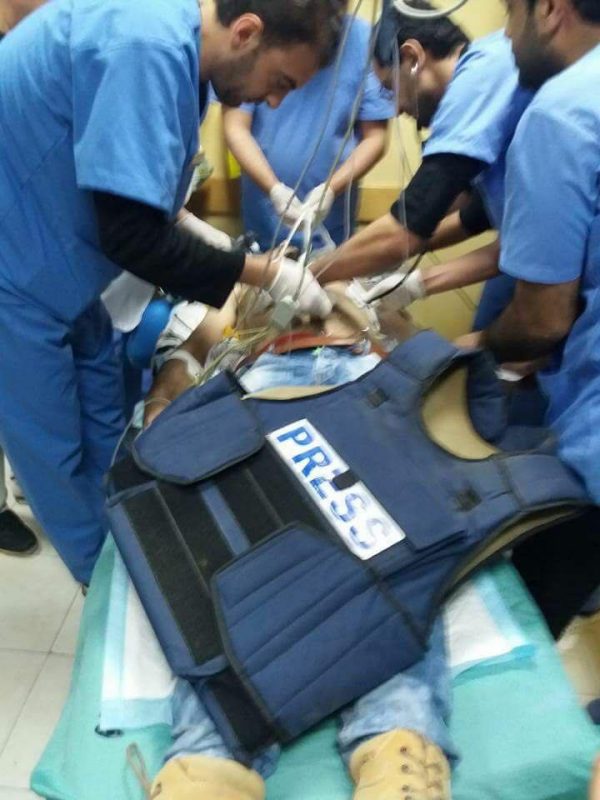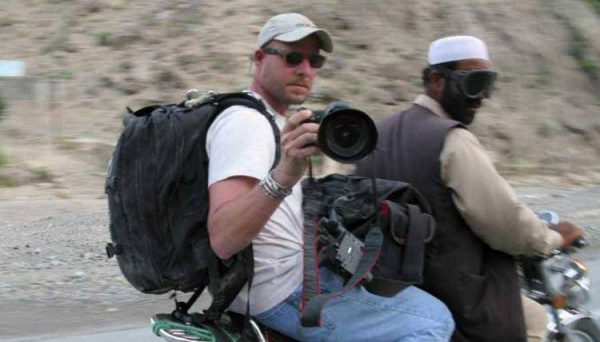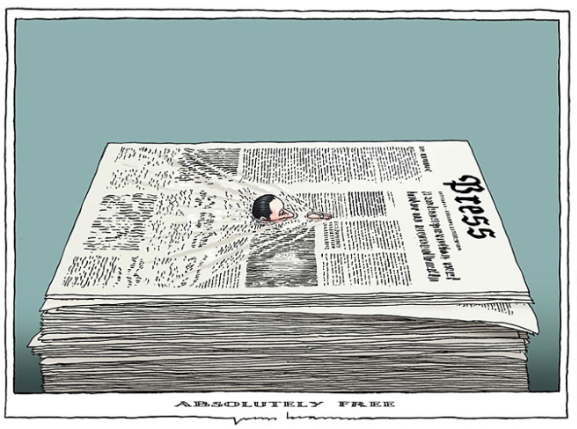On April 30, 2018, two suicide bombers struck government installations in Kabul, Afghanistan. The attacks were quickly claimed by the Islamic State’s so-called Khorasan “province,” which released a picture of the jihadists responsible and a description of the attacks through their media wing.
According to Islamic State’s report, the bombers detonated themselves near the Afghan intelligence headquarters, killing or wounding 110 people. The first attacker reportedly blew himself up near a security checkpoint for the National Directorate of Security (NDS) in the Shash Darak district of the city. The second bomber targeted journalists who were covering the aftermath of the first explosion. Jihadists have very often employed this tactic through the years, which consists of waiting for first responders and media personnel to arrive at the scene, and then executing the next stage of the attack.
According to Reporters Without Borders (RFS) the second blast killed ToloNews cameraman Yar Mohammad Tokhi, three Radio Azadai (Radio Free Europe) journalists (Ebadollah Hananzi, Sabvon Kakeker and Maharam Darani), two TV1 cameramen (Ghazi Rasoli and Norozali Rajabi, aka Khamoush), AFP photographer Shah Marai Fezi, Mashal TV reporter Salim Talash and Mashal TV cameraman Ali Salimi.
According to the report the “badly injured” wounded journalists included “Naser Hashemi of Al Jazeera, Omar Soltani of Reuters, Ahmadshah Azimi of Nedai Aghah, Ayar Amar of the weekly Vahdat Mili and Davod Ghisanai of the privately-owned TV channel Mivand.

There were a total of 15 journalist casualties, with nine killed and six others wounded. According to RFS, the incident marked “the deadliest attack on the media since the fall of the Taliban regime in 2001.”
Monday was a rampage day for Islamic State in Afghanistan.
Not long after the suicide bombings in Kabul, the Islamic State’s Amaq News Agency claimed that their militants killed an Afghan intelligence commander and wounded a police chief in a pair of bombings in the city of Jalalabad in Nangarhar province.
A third incident occurred just few hours after the NDS bombing. Media sources reporting from Khost province in the country’s east confirmed the death of Ahmad Shah, a BBC Pashto reporter. Witnesses say Shah was shot by unknown armed men who were riding a motorcycle. The fact that the Taliban categorically denied any involvement in the incident strongly suggests that ISIS may have been involved in this incident as well, although as of now, there is no direct evidence of this.
Media Hazzard
The multiple attacks on Monday highlight the persistent war on media that has been waged by militants in Afghanistan throughout the 17-year conflict.
Just a week before Monday’s bombings, unidentified gunmen killed journalist Abdul Manan Arghand on his way to work in the southern Afghan city of Kandahar. According to police, Arghand, who worked for Kabul News TV, was ambushed in his car by multiple shooters armed with assault rifles on 25 April. Ironically, the attack took place on the very day journalists convened in Kabul to discuss the persistent threat to media personnel in the country. The threat journalists are concerned about is not just the general hazards that come with covering a war-ridden country like Afghanistan. The targeting of media personnel has been a major strategic element of pretty much all extremist groups in the country. The circumstances of Monday’s twin suicide explosions also indicated the attacks were at least in part, meant to target media. Not only did the last bomber wait to detonate until reporters arrived, according to a police official who spoke to AFP news, the second terrorist “disguised himself as a journalist” before detonating himself among the crowd.
A Shadow War in a Broader Conflict
The danger facing journalists isn’t getting any better. The Afghan Journalists’ Safety Committee reported that last year was the bloodiest for media personnel, with at least 20 killed and 169 cases of violence or threats.
The current situation in Afghanistan didn’t pop up overnight. During the course of the long Afghanistan conflict, the world has gradually become aware of the unique dangers facing media. Arguably the first big milestone, at least for Americans, was the death of NPR journalist David Gilkey. In 2010, the unit of Afghan special forces he was embedded with was ambushed in Helmand Province. Both Gilkey and his translator, Zabihullah Tamanna, were killed in the battle that ensued.

Gilkey’s death marked the first instance of an American journalist killed during the Afghan conflict. At that point, 27 reporters had already been killed during the course of 15 years of fighting. But Gilkey’s death was different. Regular Americans listen to NPR. Hearing that a reporter at the station they get their news from was swept away by the otherwise far-off conflict hit close to home.
A few years later in January 2016 came the infamous attack on TOLO TV journalists in the center of Kabul, during which a Taliban suicide car bomber detonated his payload alongside a minibus carrying TOLO employees, killing seven people. The attack drew international condemnation and formed the catalyst for more organized efforts at safeguarding media workers operating in Afghanistan. The following March, journalists held a conference in Kabul, attended by international officials to strategize on the problem. One of the important revelations brought up during the gathering was made by Nicholas Haysom, the UN Secretary-General’s Special Representative for Afghanistan. During his address, Haysom told participants that media outlets were known to be official targets of several militant groups operating in the country.
The Fight of Ideas
The media industry in general is an important target for Afghan militant personnel and infrastructure due to what they both embody and represent.
For one, media stations, television channels in particular, are the transmitters of Western style communications and, even worse, entertainment. This may come as a shock to some First World readers, but Afghanistan has actually put quite a bit of effort into developing its own performance arts repertoire. Since the fall of the Taliban government following the 2001 coalition invasion, Afghanistan has produced reality talent shows, action drama series, and soap opera-style serials. Many of the productions have received international recognition and nominated for awards. One American Idol-style talent show was even the subject of a widely circulated documentary. In short, extremists see media organizations as the gateways of Western culture into Afghanistan. Since the underlying principle of all militant groups is to keep those influences out of the country, it comes as no surprise these organizations would actively seek to destroy all forms of free media.
Second, and perhaps more importantly, militants understand the power wielded by unfettered broadcasting of information. These organizations need to control the narrative. That’s why groups like ISIS maintain their own media outlets. While the Western attitude may view the war being waged on media in Afghanistan as shameful and illegitimate, the radicals see it as a natural extension of the conflict. As Nicholas Haysom said in his address to journalists nearly two years ago in Kabul, “we would want to believe that doesn’t mean an extension of the battlefield onto the terrain of ideas, where battlefield tactics are used to control who says what and influence the flow of information and opinion in Afghanistan.”

Recognizing the unique threat posed to journalists in Afghanistan is going to necessitate real policy shifts in the country. While it is impossible to make war coverage a safe occupation, protocols relating to media will have to be reassessed if there are any hopes of minimally protecting media personnel. As was demonstrated during Monday’s bombings, ISIS and others take advantage of the lack of security for media conduct. Reporters were apparently able to swarm the scene of the initial attack unabated, creating the perfect follow-up target. An attacker was able to embed himself amongst journalists without police or military authenticating his identity. Past attacks on journalists have pointed out other shortcomings, such as when media transport vehicles are left to travel alone and unprotected.
Conferences and meetings are effective only if they initiate action. Recognizing the vulnerabilities the field of journalism has to deal with in Afghanistan will hopefully bring about some important changes on the ground.
















